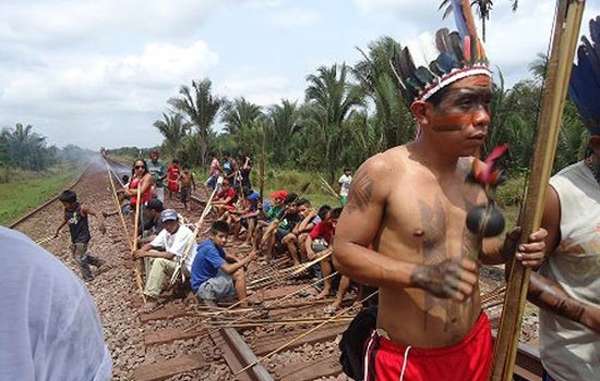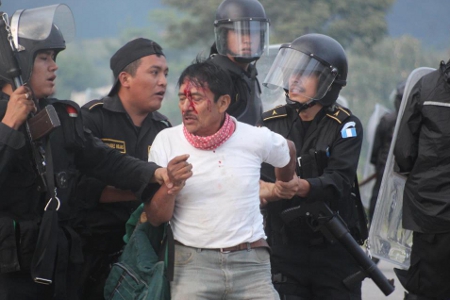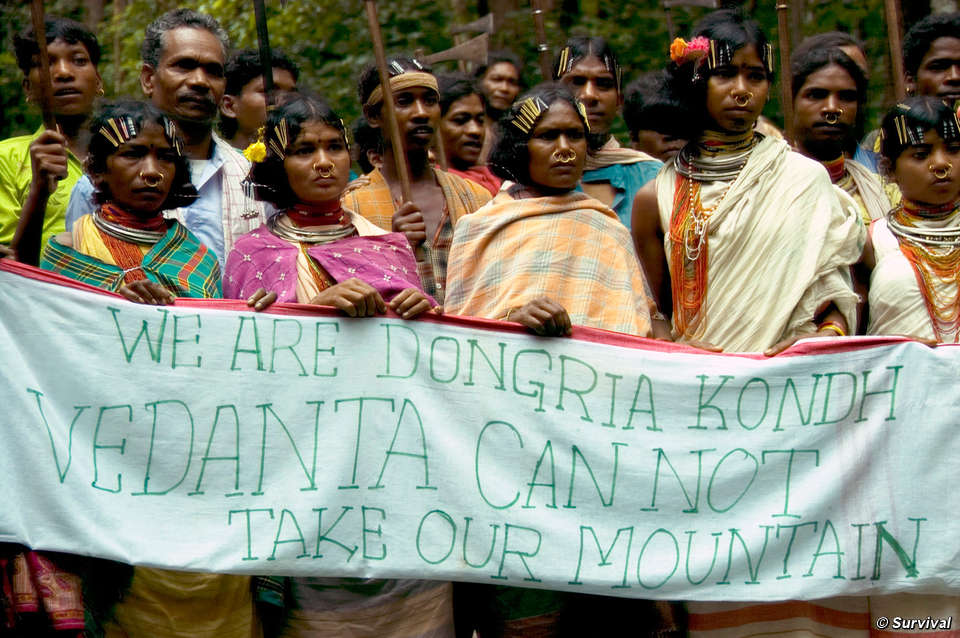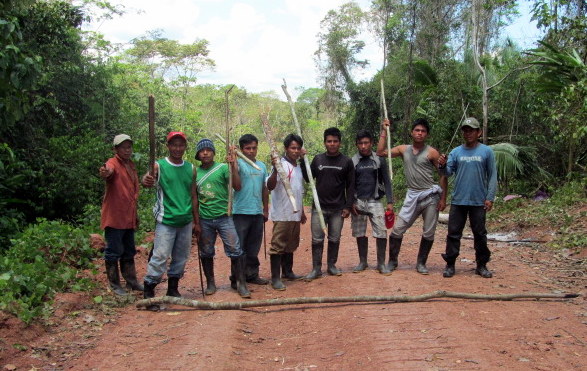
by Deep Green Resistance News Service | Oct 6, 2012 | Colonialism & Conquest, Indigenous Autonomy, Mining & Drilling, Obstruction & Occupation
By Survival International
A protest involving Earth’s most threatened tribe, the Awá, has forced the world’s largest iron ore mine to suspend operations along its main railway line.
On Tuesday, hundreds of Indians including the Awá, took to the tracks of Vale’s Carajás railway to voice their opposition to Brazilian government plans that could weaken their land rights, if legalized.
The demonstration follows months of anger surrounding a draft text called Directive 303, which prohibits the expansion of indigenous territories.
The government has refused to scrap the proposed directive, despite it violating national and international laws by suggesting certain projects can be carried out on Indian land without proper consultation.
Frustrations spilled over on Tuesday, with several different tribes uniting to demand that their land rights are respected.
The blockade is the latest in a string of controversies to involve mining giant Vale, whose railway borders the territory of the Awá.
Last month, a judge reversed a ruling that had stopped the company from doubling its railway line to increase production.
The decision was a blow for the Awá, who blame the railway for bringing thousands of invaders into their lands and scaring off the animals they hunt.
Survival’s Director Stephen Corry said today, ‘If Brazil wants to lead the way and show the world that it respects its indigenous peoples, it should not be entertaining the harmful propositions of a handful of rural lobbyists. This protest shows that for tribes like the Awá, land rights are make or break.’
From Survival International: http://www.survivalinternational.org/news/8722

by Deep Green Resistance News Service | Oct 2, 2012 | Indigenous Autonomy, Mining & Drilling
By Patricia Ardón and Orfe Castillo
“In the struggle to defend our territory, our natural resources, what’s at stake is our very existence.” – Miriam Pixtún, Indigenous Women’s Movement Tz ́ununijá
In Guatemala, the policy of enclaves and extraction of natural resources fomented by the current development model and by the transnational corporations has a tremendous impact on the life of the communities, particularly on indigenous peoples and women.
With the aim of sharing experiences and analysis among women who lead organizing in defense of rights to land, territory and natural resources in Guatemala, Sinergia No ́j, T ́zununijá, Just Associates (JASS), Uk ́Ux B ́e, Unit of Guatemalan Human Rights Defenders (UDEFEGUA), Association for Feminist Studies (AMEF) and the National Union of Guatemalan Women (UNAMG) held the national meeting “Women in Defense of of Water, Life and Territory” on Sept. 11-12, 2012. More than forty women from different parts of the country participated in the meeting.
“We resist due to the disadvantages of the megaprojects; the development that the companies offer just leaves more poverty, sickness, deaths–all kinds of problems. They use pesticides, strong chemical products. They pollute the water… our house are cracked, animals have died, now the corn doesn’t grow, it’s dried up. Water is scarce and polluted. What kind of development is this?” said one participant.
According to Carmen Lucía Pellecer, Co-Directora of Sinergia Noj, the forum enabled indigenous women to talk about experiences of resistance, the acts they carry out in their communities and in their daily lives.
Another participant pointed out, “The megaprojects represent a clash with our vision of the world, the natural resources are interconnected elements of life, we are part of it. What the capitalist companies do has consequences for our way of living together, they use impoverishment to manipulate people, they affect our health, they cause illnesses of the skin, of eyesight. The hydroelectric plants block the flow of the rivers, they cause droughts. We have been exposed to high tension wires, the looting of our lands… All the community has united to stop it but at the cost of being criminalized. They attack us for not giving in, they threaten us with prison, they don’t respect the consultation processes that are binding. For women, all this implies a heavier workload, persecution, facing militarization that revives the horrors of the war–we see soldiers and it generates terror because we know what happened to our mothers, our aunts.”
The gathering also served to present the report of the Nobel Women’s Initiative/JASS delegation, led by Nobel Laureates Jody Williams and Rigoberta Menchú. The delegation visited Guatemala, Honduras and Mexico in January of this year to examine violence against women; most of the women present at the September gathering presented testimony to the delegation in January. Many participants noted that the report helped build a regional view of the situation and of women’s struggles. These links give women a stronger voice and more political influence, they asserted.
Miriam Plxtún of the Movement of Indigeous Women Tz ́ununija identified several major achievements of the gathering, including the importance of creating their own space for recognizing and strengthening the peaceful struggle in defense of territory and natural resources, the discussion of alternatives, and the effort to build cross-border alliances that spread information on the effects of mega-projects. She also stated that the group made specific commitments to continue the analysis on key issues.
The organizations that called the event agreed on the importance of strengthening access to timely, specialized and accurate information on the impact of megaprojects on societies and on women, and of broadening networks and alliances from the local to the international level, drawing in all actors who can contribute to prevent the death and looting of the peoples.
Finally, at the gathering several women described the work being done by the Mesoamerican Women Human Rights Defenders Initiative and the National Network of Women Human Rights Defenders of Guatemala. These organizing efforts, they said, have increased recognition of women’s struggles and awareness of the security challenges for women human rights defenders.
Pixtún recalled that in Guatemala, indigenous women have a long way to go to recuperate the fundamental meaning of democracy, which is the power of the people. Women contribute in an essential way to the construction of dignified lives, she told the group, and it’s time for others–men and women–to join in this effort from all over. Indigenous peoples and women have the right to live according to their own cosmovision, to be recognized as full rightsholders and as important political actors.
From Americas Program: http://www.cipamericas.org/archives/7992

by Deep Green Resistance News Service | Sep 20, 2012 | Lobbying, Mining & Drilling, Repression at Home
By the Committee in Defence of Life and Against Mining in San Rafael Las Flores, CODIDENA, the Parlamento Xinca, CALAS, and the MadreSelva Environmental Collective
Following the events of September 17 and 18, 2012 in Mataquescuintla, Jalapa and San Rafael Las Flores, Santa Rosa, we wish to make the following statement:
TIMELINE OF EVENTS:
1. On the morning of Monday, September 17, employees of the San Rafael Mining Company, accompanied by private security agents with anti-riot equipment, attack dogs, tear-gas cannons and rubber bullet guns, and escorted by the National Civil Police, turned up in Morales, Mataquescuintla, to connect high voltage electrical wires to the San Rafael mining site.
2. Over 500 local community members, men, women and children, came out to demand that the company employees remove their equipment and leave, along with the security guards that were accompanying them. The community had already contested the installation of these electrical wires. They demand a free, prior and informed public consultation on the mining project.
3. The community protest stopped the installation of electrical wires. With the support of the PDH, COPREDEH, the Justice of the Peace and the Municipal Mayors of Nueva Santa Rosa and Casillas, the parish of Mataquescuintla, CALAS and CODIDENA drew up a document stating their desire for a peaceful solution to the dispute. However, just as the document was being signed, provocateurs hired by the mine began throwing rocks at community members and authorities, causing some damage to mining company vehicles and dispersing the group of local residents that had gathered.
4. Angered by this new affront from the San Rafael Mine, residents decided to march from Morales de Mataquescuintla to the main entrance to the mine, which is located in San Rafael. When they got there, in an act of peaceful resistance, the group set up a protest at the entrance to the mine, at the junction of the road from San Rafael Las Flores to El Fusío. At no time did the protesters infringe on the property of the San Rafael mine. They stayed on the public road and on an area of private property, with the owner’s permission. Nonetheless, the national media falsely reported that the protest had invaded the property of the mine.
5. According to eye witnesses, no protesters stepped onto the property of the mine. Given that the mine is heavily guarded, it is therefore impossible that the fire that was started inside the mine was lit without the tolerance and help of the private security guards.
6. At 3 pm, the peaceful protest was attacked without warning by members of the mine’s private security agency, the National Civil Police and the army, using tear gas cannons, firearms and rubber bullet guns. Security agents attacked from inside the mine, with trained attack dogs. The Police cornered the unarmed protestors, and the army surrounded them, crouched and at the ready. The display of repressive force had all the characteristics of military counter-insurgency tactics that we had thought belonged to the past, including the bad intentions, brutality and cowardice that so characterize the tactics of the National Army.
7. This was a cowardly attack by public and private repressive forces against a peaceful civilian group exercising their constitutional right to protest, amongst whom were women with infants, elderly people and small children. Protesters were busy preparing food for all those present, which shows their intention to hold a peaceful protest.
8. From the outset, residents of Santa Rosa have opposed the San Rafael mining operation. The mine was created without prior information or due consultation on the social and environmental impacts that would affect the water supply and the life of the inhabitants of the Santa Rosa valley. This peaceful, legal resistance has included legal documents presented to the Minister of Energy and Mines; peaceful marches from the village to the mine site; protests in front of the Canadian Embassy; visits to the Ministry of Energy and Mines and the Ministry of the Environment; debates with mayoral candidates and meetings with elected mayors; all of which form part of the “Revolución de las Flores” (Revolution of the Flowers) – a peaceful movement. Three public consultations have been carried out in Nueva Santa Rosa, Santa Rosa de Lima and Casillas, and the majority of the people have expressed their opposition to mining.
9. In the meantime, residents of San Rafael have requested that their consultation be recognized as legally binding as per the Municipal Code by mining company lawyers who have boycotted it thus far. Residents also ask for recognition of the consultation by Mayor Leonel Morales Pozuelos and his Municipal Council, whom they hold directly responsible for this conflict and its consequences because of their attitude of servility to the mine and their refusal to respect the demands of the people of San Rafael.
10. As we write this press release, we have just learned that army helicopters are flying over San Rafael and Mataquescuintla, threatening residents, like in the old days of the armed conflict. Once again, the army is carrying out a psychological and military attack on the civilian population to defend the interests of foreign companies.
WE DENOUNCE:
• The criminalization of community leaders who are legitimately defending their lands and their rights against the spurious interests of national and foreign extractive companies that take advantage of the weakness of national laws and corrupt civil servants who have sold out, allowing the destruction of natural resources of our country.
• This kind of provocation is being systematically used by national and foreign companies to further the growth of extractive projects that threaten our natural resources and our lands and are in flagrant violation of the rights of the people, as was demonstrated by what happened in Santa Cruz Barillas and San José del Golfo and San Pedro Ayampuc.
• We warn the government of the country that it should not once again attempt to suspend the constitutional rights of the residents of Santa Rosa, as they tried but failed to do in Santa Cruz Barillas.
We demand that the President of the Republic, the Congress, the Supreme Court, the Public Prosecutor of the Public Ministry, the Army and the National Civil Police:
1. carry out a thorough investigation of the events we denounce here.
2. stop criminalizing the just struggle of the residents of Santa Rosa and Jalapa.
3. punish those responsible for the provocation staged by the mining company and its private security agents.
4. ensure that the Ministry of Energy and Mines deal with the many opposition documents presented by the residents of San Rafael Las Flores regarding the request for an exploitation licence by the San Rafael Mine.
5. cancel the mining exploration licence permanently and refuse to grant under any circumstances an exploitation licence to San Rafael Mining Company.
6. respect the wishes of residents of the municipalities of the Santa Rosa Valley – they have shown their clear opposition to mining activity in the area in a public consultation.
7. refrain from using the state of siege to criminalize and try to prosecute Santa Rosa community leaders who continue the struggle for life, natural resources and land for the benefit of future generations.
8. free the more than thirty community members that have been detained.
WE APPEAL TO:
1. the International community – to pay attention to these violations of human rights in San Rafael Las Flores and Jalapa.
2. the Human Rights Prosecutor – to strictly survey and protect the human rights of our communities, peoples, leaders and social organizations.
3. indigenous, campesino, union, women’s, environmental, youth, etc., social movements – to keep watch on how the situation in Santa Rosa develops and to give their solidarity and support to this just and exemplary struggle.
From Upside Down World: http://upsidedownworld.org/main/guatemala-archives-33/3876-guatemalan-government-and-mining-company-attack-community-members-in-san-rafael-las-flores

by Deep Green Resistance News Service | Sep 18, 2012 | Colonialism & Conquest, Indigenous Autonomy, Lobbying, Mining & Drilling
By Survival International
Supporters of India’s Dongria Kondh tribe are celebrating after controversial British mining company Vedanta Resources declared it will close its bauxite refinery in the state of Orissa, this December.
The news is a major breakthrough for the tribe, who have fought a David and Goliath battle against Vedanta’s plans to extract bauxite from their land.
Dongria leader, Lodu Sikaka, said today, ‘We will be happy if the company leaves. If the refinery is there, they will keep trying to take our mountain, if not today, then tomorrow, or two years, 10 years from now.’
The Lanjigarh refinery sits at the base of the Dongria Kondh’s Niyamgiri Hills, which are home to the 8,000-strong tribe, and the seat of their god Niyam Raja. The company has spent more than one billion US dollars expanding the site without securing all the required clearances, as well as knowing it was unable to source enough bauxite to run the refinery at capacity.
Vedanta has now blamed the closure on a ‘depleting stock position of bauxite’. But, there are concerns the company’s announcement is intended to pressure the government into allowing it to mine the Niyamgiri Hills. The issue has returned to India’s Supreme Court, but the case is currently adjourned.
Opposition to Vedanta’s push to mine the mountains has embroiled the company in a near decade-long dispute, and forced the Lanjigarh refinery to be run with bauxite from different mines across India. A Vedanta spokesman claimed this has cost the company half a billion dollars.
Survival International’s Director Stephen Corry said today, ‘When we started our campaign for the Dongria Kondh, we were repeatedly told it was a hopeless case and the mine would be built. It hasn’t been. The infrastructure is rusting away and now Vedanta says it will shelve its refinery. This is a fantastic vindication of the tribal people’s determination to keep the lands which are rightfully theirs, and the pressure brought to bear by thousands of their and our supporters around the world. Public pressure is the only thing which can save tribal peoples in the long-term, and it works.’
From Survival International: http://www.survivalinternational.org/news/8670

by Deep Green Resistance News Service | Sep 14, 2012 | Colonialism & Conquest, Indigenous Autonomy, Mining & Drilling
By Amazon Watch
Today Talisman Energy (TLM) announced its decision to cease oil exploration activities in the Peruvian Amazon and to exit the country upon completion of ongoing commercial transactions.
“We have fought long and hard against Talisman’s drilling in our territory because of the negative environmental and social impacts we have seen from oil drilling around the world,” said Peas Peas Ayui, President of the National Achuar Federation of Peru (FENAP). “Now that Talisman is leaving we can focus on achieving our own vision for development and leave a healthy territory for future generations.”
Talisman is the fifth oil company to withdraw from controversial Block 64, located in the heart of indigenous Achuar territory in a remote and bio diverse region of the Amazon rainforest. Talisman has been exploring in Peru since 2004 and has come under increased pressure by human rights groups and shareholders for operating without Achuar consent.
“Talisman has had to face up to what the Achuar told them when they first invested in Block 64: The company cannot drill without the consent of the Achuar people,” said Gregor MacLennan, Peru Program Coordinator at Amazon Watch. “Talisman’s exit sends a clear message to the oil industry: Trampling indigenous rights in the rush to exploit marginal oil reserves in the Amazon rainforest is not an option.”
Despite Talisman’s claim of attaining local support from communities and signing good neighbor agreements with 66 communities downriver from their operations, the company never had the consent of the majority of communities living within Block 64. Talisman first invested in Peru one year after leaving Sudan and became sole operator in 2007, shortly after John Manzoni’s appointment as CEO. Manzoni was replaced by ex-TransCanada CEO Hans Kvisle on Monday this week.
“We are the owners and the original people of this land,” said Peas Ayui. “No outside person or company may enter our territory by force, without consultation and without asking us. We have been fighting against oil development on our land for 17 years and we maintain the same vision to protect our territory and resources for future generations. Let this be a clear message to all oil, mining and logging companies: we will never offer up our natural wealth so that they can extract our resources and contaminate our land.”
Block 64 is just one of several new efforts to extract oil from the headwaters of the Amazon in Northern Peru and Southern Ecuador, among the most bio diverse places on earth. Anglo-French company Perenco was recently awarded a production license to operate in Block 67 in Peru despite a legal case against them for drilling in isolated peoples’ territory. ConocoPhilliips has faced mass protests in Iquitos, Peru over plans to drill wells in a protected area in the Nanay river basin east of Block 64. In Ecuador, the government plans to auction new oil blocks on the Peruvian border despite strong indigenous opposition. The Kichwa community of Sarayaku recently won a case in the Inter-American Court of Human Rights against the Ecuadorian government for signing an oil contract without their consent or consultation.
From Amazon Watch: http://amazonwatch.org/news/2012/0913-talisman-energy-withdraws-from-peruvian-amazon

by Deep Green Resistance News Service | Sep 10, 2012 | Indigenous Autonomy, Mining & Drilling, Obstruction & Occupation, Toxification
By Ronald Suarez, Network of Peruvian Indigenous Communicators, Ucayali
Over 400 villagers in the Native Community of Canan de Cachiaco in the Ucayali region of the Peruvian Amazon have taken control of nine oil wells, belonging to oil company, Maple Gas, in oil lot 31B.
Community members took over the oil wells on September 2nd, and continue to hold them as a result of 37 years of oil contamination in their territory by the company.
The community leader, Basilio Rodriguez Venancio, said the action was made necessary because the company did not consider the environmental impact assessment carried out by an independent consultant.
The community is demanding that the company pay them compensation for the use of their lands and for the environmental damage they have suffered for 37 years. Such damage includes the contamination of their rivers, their only source of drinking water, and the contamination of their soils due to the company’s use of chemicals and heavy minerals, which the population says has significantly affected the productivity of their land.
Several community members testified that they have become sick due to the company’s negligence and contamination of their drinking water. There have been several instances in the past years of cancer and ¨unknown deaths¨ that the community attributes to company abuses.
The community awaits the arrival of state representatives from the Ministry of Energy and Mines and Ministry of Environment, scheduled for Thursday, September 13th, to resolve this conflict.
Meanwhile the villagers are still stationed in the camp until authorities settle their claims.
From Alianza Arkana






